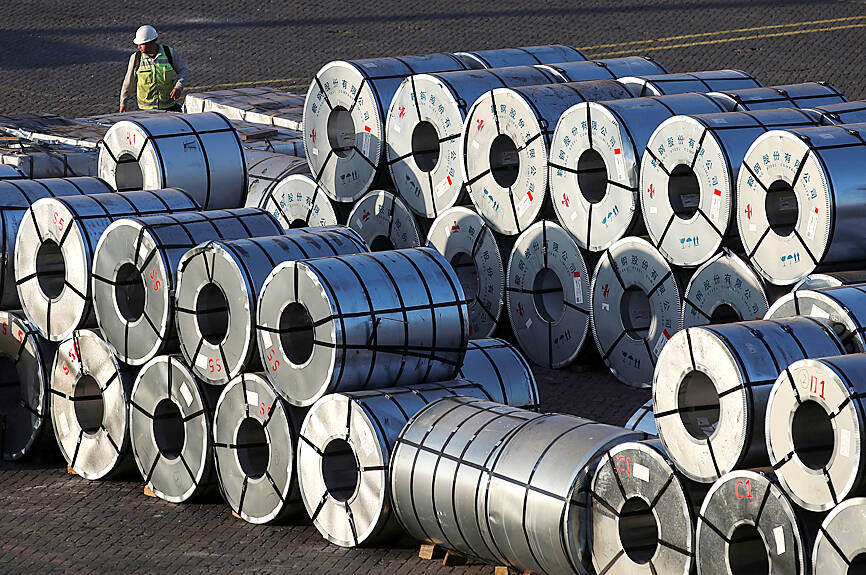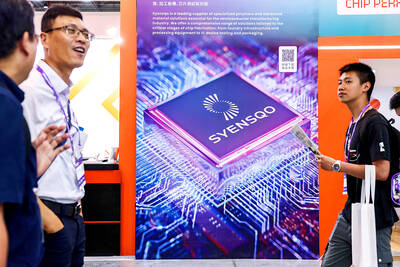The US Department of Commerce on Tuesday said that it would hike steel and aluminum tariffs on more than 400 products including wind turbines, mobile cranes, appliances, bulldozers and other heavy equipment, along with railcars, motorcycles, marine engines, furniture and hundreds of other products.
The department said 407 product categories are being added to the list of “derivative” steel and aluminum products covered by sectoral tariffs, with a 50 percent tariff on any steel and aluminum content of these products plus the country rate on the non-steel and non-aluminum content.
Evercore ISI said that the move covers more than 400 product codes representing more than US$200 billion in imports last year and estimated it would raise the overall effective tariff rate by about 1 percentage point.

Photo: Reuters
The department is also adding imported parts for automotive exhaust systems and electrical steel needed for electric vehicles (EVs) to the new tariffs as well as components for buses, air-conditioners as well as appliances including refrigerators, freezers and dryers.
A group of foreign automakers had urged the department not to add the parts, saying the US does not have the domestic capacity to handle demand.
Tesla Inc unsuccessfully asked the department to reject a request to add steel products used in EV motors and wind turbines, saying there was no available US capacity to produce steel for use in the drive unit of EVs.
The new tariffs take effect immediately, and also cover compressors, pumps, and the metal in imported cosmetics and other personal care packaging such as aerosol cans.
“Today’s action expands the reach of the steel and aluminum tariffs and shuts down avenues for circumvention — supporting the continued revitalization of the American steel and aluminum industries,” US Under Secretary of Commerce for Industry and Security Jeffrey Kessler said.
Steelmakers including Cleveland Cliffs Inc, Nucor Corp and others had petitioned the administration of US President Donald Trump to expand the tariffs to include additional steel and aluminum auto parts.

SEMICONDUCTOR SERVICES: A company executive said that Taiwanese firms must think about how to participate in global supply chains and lift their competitiveness Taiwan Semiconductor Manufacturing Co (TSMC, 台積電) yesterday said it expects to launch its first multifunctional service center in Pingtung County in the middle of 2027, in a bid to foster a resilient high-tech facility construction ecosystem. TSMC broached the idea of creating a center two or three years ago when it started building new manufacturing capacity in the US and Japan, the company said. The center, dubbed an “ecosystem park,” would assist local manufacturing facility construction partners to upgrade their capabilities and secure more deals from other global chipmakers such as Intel Corp, Micron Technology Inc and Infineon Technologies AG, TSMC said. It

EXPORT GROWTH: The AI boom has shortened chip cycles to just one year, putting pressure on chipmakers to accelerate development and expand packaging capacity Developing a localized supply chain for advanced packaging equipment is critical for keeping pace with customers’ increasingly shrinking time-to-market cycles for new artificial intelligence (AI) chips, Taiwan Semiconductor Manufacturing Co (TSMC, 台積電) said yesterday. Spurred on by the AI revolution, customers are accelerating product upgrades to nearly every year, compared with the two to three-year development cadence in the past, TSMC vice president of advanced packaging technology and service Jun He (何軍) said at a 3D IC Global Summit organized by SEMI in Taipei. These shortened cycles put heavy pressure on chipmakers, as the entire process — from chip design to mass

People walk past advertising for a Syensqo chip at the Semicon Taiwan exhibition in Taipei yesterday.

NO BREAKTHROUGH? More substantial ‘deliverables,’ such as tariff reductions, would likely be saved for a meeting between Trump and Xi later this year, a trade expert said China launched two probes targeting the US semiconductor sector on Saturday ahead of talks between the two nations in Spain this week on trade, national security and the ownership of social media platform TikTok. China’s Ministry of Commerce announced an anti-dumping investigation into certain analog integrated circuits (ICs) imported from the US. The investigation is to target some commodity interface ICs and gate driver ICs, which are commonly made by US companies such as Texas Instruments Inc and ON Semiconductor Corp. The ministry also announced an anti-discrimination probe into US measures against China’s chip sector. US measures such as export curbs and tariffs